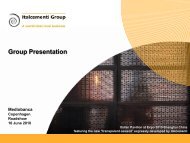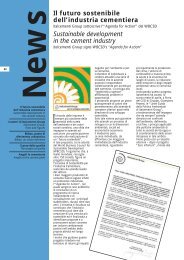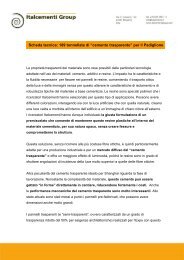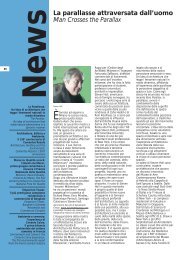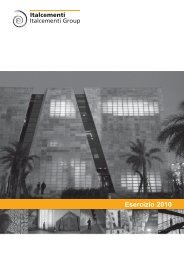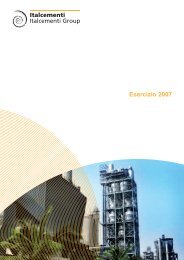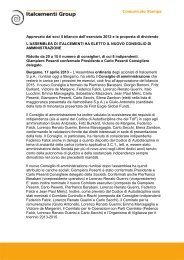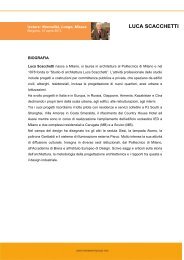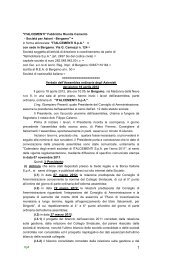2012 Annual Report - Italcementi Group
2012 Annual Report - Italcementi Group
2012 Annual Report - Italcementi Group
You also want an ePaper? Increase the reach of your titles
YUMPU automatically turns print PDFs into web optimized ePapers that Google loves.
3 Social responsibility<br />
3.1 Valuing people<br />
The <strong>Group</strong> Human Rights Policy reinforces the <strong>Group</strong> commitment by explicitly supporting internationally<br />
proclaimed human rights as inalienable rights of all the individuals. The Policy also shows the <strong>Group</strong><br />
commitment of not being complicit in any human rights abuse in the countries in which it operates.<br />
In 2008, the <strong>Group</strong> has signed the Buildings and Wood Workers’ International (BWI) Agreement. It represents<br />
a real charter of workers’ rights, valid worldwide and based on the joint commitment of all signatories to respect<br />
fundamental human rights, promote improvements in working conditions, develop equitable industrial relations<br />
and to foster fair collective bargaining procedures with trade union representatives. Collective labor<br />
agreements, also embedding health and safety topics, cover nearly all employees among all countries,<br />
remaining currently excluded some areas, like Kuwait and Saudi Arabia, where this practice is not common in<br />
the labor market, and a few locations in the US where the unionization is not in place for reasons independent<br />
from the company’s will. In Morocco, in line with the evolution of the local labor law regulations, collective<br />
agreements are being planned with the relevant industry and workers organizations. The number of employees<br />
not covered by those agreements is around one thousand among the total of the <strong>Group</strong>. Joint committees<br />
forums between trade unions and management are part of the approach to sustain constructive dialogue with<br />
workers and workers’ representatives. This includes also transnational initiatives like the European Work<br />
Council, sharing periodically <strong>Group</strong> strategies and major projects. Same principles are promoted through the<br />
supply chain.<br />
Within the framework of the Italian network of the UNGC, the <strong>Group</strong> is working on its first tailored tool for<br />
Human Rights Impact Assessment. It will be implemented starting from the countries of concern where the<br />
<strong>Group</strong> operates, as identified by the Freedom House (they represent 32% of the <strong>Group</strong> revenues in <strong>2012</strong>).<br />
Meanwhile, the <strong>Group</strong> collects data and information of any possible incident related to human rights and<br />
working conditions. Whenever a critical situation is detected, the <strong>Group</strong> is reacting. Still around 100 critical<br />
situations were detected and solved in <strong>2012</strong>, mostly related to the risk of inequality of treatment or working<br />
conditions of contracted workforce.<br />
In most subsidiaries, the same benefits are given equally to full-time employees and temporary or part-time<br />
employees. Minor distinctions are applied in Kazakhstan, Morocco, India and Thailand, where some elements<br />
like performance bonus or complementary medical insurance are differently managed.<br />
At year end, the <strong>Group</strong> employed a total of 18,886 employees operating in more than 20 countries. The work<br />
organization includes also working shifts in production sites, normally based on 8-hour shifts. Only in two<br />
subsidiaries, North America and Kazakhstan, 12-hour shifts are also used for a limited number of special tasks,<br />
but with two employees on duty and keeping the limit of 40 base hours per week.<br />
Triggered by the enduring worldwide crisis, some restructuring activities are unavoidable. Most significant<br />
actions, including the “2015 Plan” launched to improve competitiveness on the Italian market, will be more<br />
evident starting from next consolidation. Restructuring plans are managed through union agreements, early<br />
retirement programme and overtime reduction. Nevertheless, six major countries out of eleven have<br />
experienced strike actions, for general reasons and also including those linked to the heavy social unrest in<br />
Egypt. Trend of salaries is in line with local context, knowing that <strong>Group</strong>’s subsidiaries keep a salary policy<br />
conveniently above local market.<br />
<br />
320



